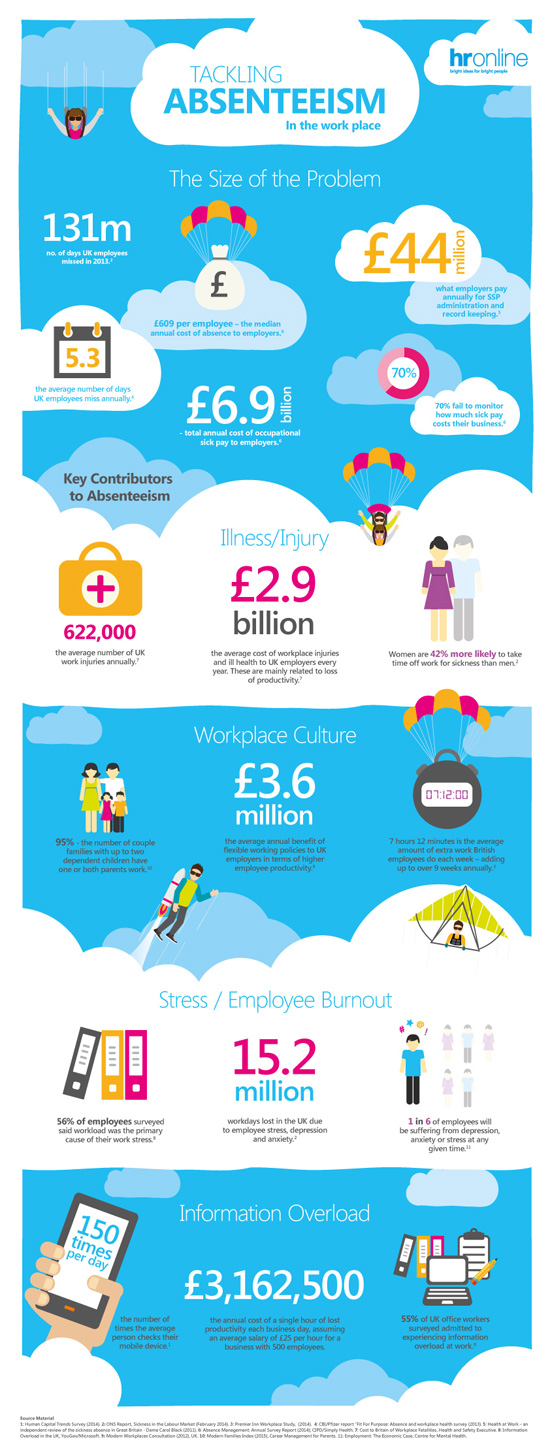Tackling Absenteeism in the Workplace
29th April 2015

Copy and Paste the Code Below to Embed the Infographic on Your Site
According to the Office for National Statistics, there are currently about 31 million people in employment in the UK. Of those, roughly 8.5 million work part-time (74% of whom are women) and 22.5m work full-time (37% of whom are women).
Those stats should give some context to the figures we have collated for our “Tackling Absenteeism in the Workplace” infographic. Because the breath-taking figures show that the UK is a nation whose employers are losing millions of hours of paid work every year – hours which in many cases are avoidable.
Not Coming In…
The ONS report quoted in the infographic says UK employers lost 131 million days’ work in 2013, which equates to 5.3 days off per employee per year, at an annual costs of £609 per employee. The cost may indeed be higher when disruption is taken into account, for example pauses in supply chains caused by a critical staff member being absent.
And Employees Know they Won’t be Missed
And interestingly, 70 per cent of companies don’t even bother to monitor the cost of sick pay to their businesses. Considering the amount of detail they no go into on all other aspects of their incomings and outgoings, it’s odd to think that so many see staff absenteeism as an expense that’s so unavoidable that it’s hardly worth trying to calculate.
Perhaps if more of them did look into absenteeism and ways of tackling it, the figures for absenteeism would come down. There’s plenty of evidence to suggest that employers that are vigilant about absenteeism – for example those that insist on return-to-work interviews – suffer less from it.
Pinching and Tapping Away the Hours
Take another seemingly innocuous stat: that the average employee looks at his or her mobile device 150 times a day. Most looks will no doubt be swiftly checking for text messages, social media updates or missed calls, but if just one in ten of those checks leads to two minutes’ reading, it adds up to half an hour lost every day. And that’s just an average … we probably all know a few addicts for whom half an hour during the day would lead to serious withdrawal symptoms.
It might be time to have a look at your social media at work policies. Some social media access – and some contact with the outside world in general – might not be such a bad thing in moderation. But letting it get out of hand can cripple productivity. Have a look at our post on the subject – there are good ways to compromise.
Although They Might Make Up for it Elsewhere
Maybe a bit of tolerance for employees’ letting their private lives poke into the workplace shouldn’t be threatened too much. A Premier Inn Workplace Study found that on average, employees do over seven hours’ extra work each week – a surprisingly high figure. All those early starts, late finishes, short lunches and emails over dinner really do add up, and will on the whole go unclaimed-for.
But where employee enthusiasm ends and pressure to outperform colleagues starts is another matter. It’s inevitable that there will be times when employees put in some hours to meet deadlines or catch up, but when it becomes expected it can lead to work-related stress and family problems. With 15.2 million days lost in the UK each year to stress, depression and anxiety, driving your employees too hard and pitting them against each other to be the hardest-working clearly has the potential to backfire.
Time to Remove your Head from the Sand
All in all, the startling figures show a complicated picture. Absenteeism is a serious and costly issue, but some of it could well be down to the high-pressure culture that dominates many workplaces. Fear of unemployment certainly pushes employees to try harder to please, and throughout the economic crisis that has only recently turned the corner, burnout has been a present danger. (Hopefully the upturn will ease this trend).
But on the other hand, there seems to be a lot of time wasted, both through distraction from mobile phones and “sick” days that are really nothing of the sort. This too can contribute to the extra hours that cause stress – employees who don’t meet their weekly quotas might be prepared to eat into their personal time to get it finished.
Many of the issues can be solved with good monitoring – the kind that hronline offers – and, of course, with taking the appropriate action when individual employees are found to be underperforming or showing signs of stress.
It all comes down to paying attention, and we’ve got the tools to help you do it.

